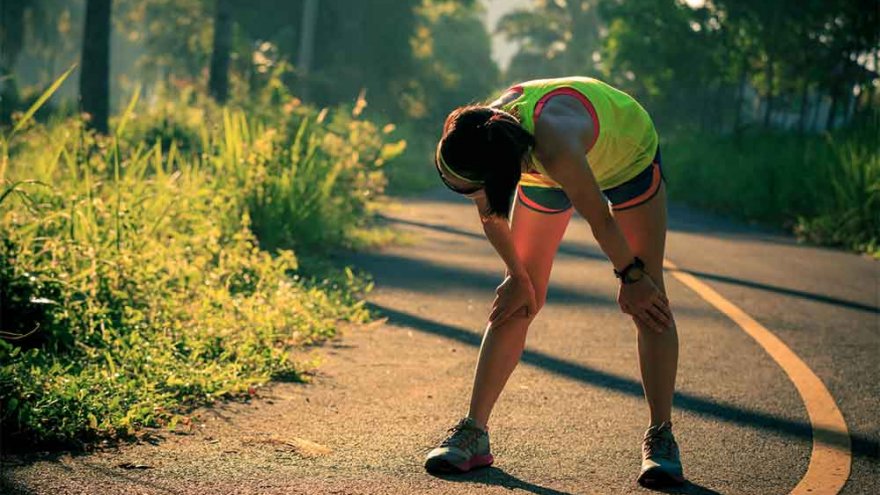Why You Might Feel Nausea When Or After Running

Most runners can relate to the feeling of nausea either during or post-workout. What does it mean? Why does it happen? Is there something you can do in order to get your tummy back to normal faster?
Why Do I Feel Nauseous Running?
Running-induced nausea is a very real thing. If you are like me, you have wondered why this happens. While you are running, your blood flow gets diverted from your GI tract to other parts of your body.
Now before you think this seems like a flaw in the way the body works, remember that you have other essential organs that need that blood. The impact of this means that your stomach no longer works towards the digestion of food. This is especially true if you eat too close to your workout.
Another thing that can create running nausea is running when it is hot out. As your body starts to heat up, it redirects blood flow to your skin to help cool you off. This means even less blood in the digestive tract.

Dehydration can also contribute to nausea both during and after your run. This is just one more reason why you should always be cognizant of how much liquid you are taking in when running. Many people neglect this.
Jostling up and down during running can also negatively impact your body. Everything in your stomach causes acid to slosh around, as well as pushing your body waste to want to leave your body.
You are also more likely to experience stomach issues during a very strenuous workout. This can be anything from doing sprints on the track to a really tough tempo run with a challenging pace as the meat of the workout. Thinking back to my track coaching days, we watched more than one athlete make a street pizza during interval repeats.
Lastly, the food you put into your body both before and during your run impact how your body will respond.
What is Runner’s Stomach?
Runner’s stomach can mean a lot of different things. Some people experience nausea during running, others are nauseous after running, and still, others struggle through a desperate need to poop.
Whichever problem you suffer from, suffice it to say that they are all horrible to deal with.
6 Ways to Prevent Nausea When Running
- Pre Run Meals: The first important thing to do is to try to alleviate the problem, to begin with. This starts with making good food choices the night before and the morning of your long runs and track workouts.
- Fuel Smart: Consider the fuel you take into your body during the run. As someone who struggles with exercise stomach issues, I am very careful what I use for fuel while running. My favorite? Honey Stinger waffles.
- Hydration: Proper hydration is essential to keep nausea away. While some people can fuel with sports drinks, others need plain old water. Find what works for you and stick to it.
- Probiotics: A running coach and friend of mine suggested I use a daily probiotic to help prevent my stomach issues when I run. I was doubtful but pleasantly surprised that it seems to help!
- Practice: You should always practice what you plan to do on race day. That means if you plan to fuel with gels or chews, use them for your long runs. If your body fails you on a training run, you can go home and try again. If this happens on race day, all your hard work could end up derailed.
- Nothing New on Race Day: This is perhaps the most important thing. Unless you are desperate, nothing new on race day. That means fuel, hydration and apparel.
Should I Stop My Workout If I Feel Like Throwing Up?
That depends. What are you doing? What are your goals? How close to finished are you? When I am doing high-intensity interval training, I often feel like I might barf during the exertion phase. In a HIIT workout, you know that the sweet relief of rest is right around the corner. I usually push through this.
When running hard on the track, I also push through. After all, there is rest right around the corner. Short sprint intervals such as 100, 200 and 400-meter runs are over fairly quickly. If I am doing mile repeats, it is harder to push through when that nausea hits.
During a long run, I am likely to dial back on the intensity. Sometimes just ratcheting it down a notch can help you get the feeling to pass.
If I feel like I am going to throw up, I am way more likely to keep pushing than if my GI symptoms are something else. After all, you can puke, eat the chunks fly and keep on going.
If your issue is a sudden urge to poop, you have an entirely different problem. These GI symptoms are often linked.
Post-Run Nausea
We all have that friend who can eat right after a run (I am that friend!). On the one hand, you are told to refuel with protein and a carbohydrate shortly after your workout. On the other hand, if you are nauseous this can be hard.

If your stomach is in knots after your run, you should start out slowly with food. Find something fairly bland to take in, such as a banana or plain bagel. That might be easier on your digestive system.
Sure, there are races that hand you a beer and a bratwurst after you finish your run (or is that only in Wisconsin?). If your stomach is turning, resist the urge to eat or drink something like that too quickly.
Foods to Avoid
When thinking about your food before you workout, you may wish to stick to foods that are bland, easy to digest and unlikely to cause reflux. Avoid anything high fat, high fiber or high protein. Most people also find acidic food to be upsetting to their bodies.
If something upsets your stomach or gives you reflux outside of exercise, it is certainly a no-no pre-workout. For example, orange juice haunts me on a normal day. There is no world where I would have OJ or even orange slices the morning of a race.
I like to stick to something super easy on my stomach like oatmeal or a bagel pre-run. During my long run, I stick to something familiar that I know works for me.
Good Luck!
If you have suffered from stomach issues while running, hopefully, these tips will help you to alleviate that! With careful planning, you may be able to avoid the dreaded runner’s stomach.
Latest Articles
 Is Running on a Treadmill Easier Than Running Outside?Runners have their own preferences, whether it is treadmill running, running outside on the road, or exploring trails. So...
Is Running on a Treadmill Easier Than Running Outside?Runners have their own preferences, whether it is treadmill running, running outside on the road, or exploring trails. So... Is It OK to Use Trail Running Shoes on the Road?While trail running shoes can be used on roads, especially in situations where a runner encounters mixed terrains or pref...
Is It OK to Use Trail Running Shoes on the Road?While trail running shoes can be used on roads, especially in situations where a runner encounters mixed terrains or pref... How to Fix Sore Quads After Running?Rest, ice, gentle stretching, and over-the-counter pain relievers can help soothe sore quads after running. Also, ensure ...
How to Fix Sore Quads After Running?Rest, ice, gentle stretching, and over-the-counter pain relievers can help soothe sore quads after running. Also, ensure ... 10 Fruits With The Most Electrolytes to Replace Sports DrinksThese fruits are high in electrolytes such as potassium, magnesium, and calcium, essential for hydration, muscle function...
10 Fruits With The Most Electrolytes to Replace Sports DrinksThese fruits are high in electrolytes such as potassium, magnesium, and calcium, essential for hydration, muscle function...

